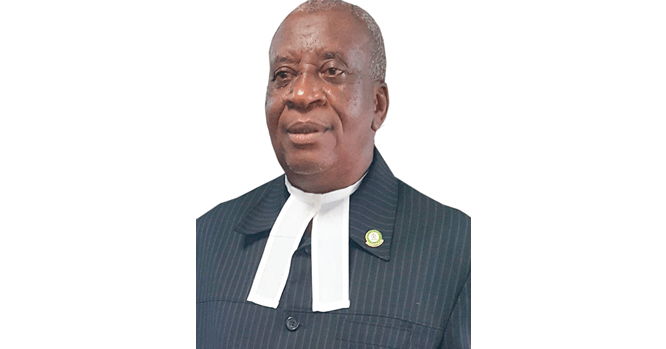...To get all news updates, Join our WhatsApp Group (Click Here)
Also Join our WhatsApp Channel (Click Here)
The campaign for disbandment of the Special Ant-Robbery Squad, (SARS) of the Nigeria Police Force has been on for the past few weeks because of the operatives’ complicity, excesses and sometimes unprofessional activities. Alhaji Olayinka Balogun, a lawyer who retired in 2012 in Benin, Edo State as Commissioner of Police, in this interview with BIYI ADEG0ROYE, gives retrospective dimension to the matter and offers some suggestions
What is the historical basis for the establishment of the Special Anti Robbery Squad?
Following the end of the Nigerian Civil war, there was an increase in armed robbery and other violent crimes due to proliferation of arms. So the political leadership and the police hierarchy saw the need to set up a special force to address the situation. Don’t forget that even as at then the various police commands already had their respective Anti-Robbery Section at the State Criminal Investigations Departments (SCIDs). In those days, those ones just came around to handle such cases because the level was not sophisticated for them to move out. They were placed under the Commissioner of Police as at then and expectedly, they made a lot of inroads into anti-robbery operations. Of course, you can remember what happened in Lagos during Col. Buba Marwa’s time, and the successes recorded gives further justification for the existence of the squad. And it went on like that such that it became a very big organization fighting mainly armed robbery and other major violent crimes.
In other words, you recognize that SARS played a major role in handling violent crimes?
Yes, there is no doubt about that, and that informed its formation in the first place.
How then do you see the call for the disbandment of SARS, on the grounds of murder, torture and human rights abuses?
Well, it is a reaction to the excesses of some of SARS operatives like murder and those infractions you have mentioned. But the issue of scrapping it does not arise at all. We cannot scrap SARS because of the excesses of a handful of operatives. All that is required is to ensure adequate monitoring and checks. Operatives of SARS have a lot of powers and mind you, they are trained to engage armed robbers. So all that is required is to ensure they operate within the ambit of the law.
One point that must be recognized is that SARS is a special wing of the police made up of brave, volunteer police officers. Only very brave and daring officers move to SARS. A lot of them lose their lives there, leaving their dependants behind. Hence, it is a place for very loyal and serious- minded officers. If, by any chance, some miscreants find their way into the squad, that must be dealt with.
One of the things we need to do is to appoint officers with integrity, respect for law and human rights, officers that are ready to work as head of SARS in each of the SCIDs. Then we need to weed out the bad eggs there, and those who have over-stayed, because actually a number of them have stayed there for four, five, six years or more. They are no longer useful there. Some of them even have the wrong motive for going there – for material benefits or whatever they can acquire. Some of them are really bad; there is no doubt about that.
But that is no sufficient reason for calling its scrapping. It is like saying we should scrap the police – or that we should scrap the Nigeria Customs Service, because some officers there are corrupt or sorts. You can imagine the far-reaching consequences that will come with that. Even among journalists, we have good ones and bad ones as well. Even in the family, we have various types of people and do you disown such people because you want to address a problem? What we need to do is to reorganize the place and inject new hands.
I am aware there are some departments in the police that serve as internal control mechanism?
Look, unlike other organizations, the police have its internal cleansing system. There is the anti-corruption unit like the X-Squad. For instance, at the divisional level, if a policeman errs, the DPO takes action and ensures that he is tried orderly room and appropriate action is taken within a week. The same thing is applicable to men of the anti-robbery section. The Commissioner of Police and the Provost are there to handle that. That is the way it is in all formations in the Force. So if bold and professional officers are given the headship of the place things will improve.
A few days ago, 30 SARS members were reportedly arrested for extortion and sundry crimes. Do you see this as one of the measures to clean up the place?
It is one of the efforts to clean up the place no doubt, except that I see that as an unnecessary fire brigade approach. We want to avoid playing to the gallery. I want a situation where there is result-oriented, sustained efforts to ensure sanity in SARS. I was Deputy Commissioner at SCID, Panti in Lagos and what we had to avoid was this issue of abuse. A situation where complainant will leave Police Division, Area Command to take a case of fraud to SARS and they accept it for investigation? That to me is an absurdity. It is not in their purview at all. Sometimes, you see them arresting people in the night; you see SARS men forcing themselves into people’s homes at midnight, and at the end of the day you will discover that they were there to arrest somebody over issuance of dud cheque! What is their business with that? Ironically, a lot of them do this because of monetary benefits and all that, thereby giving the force a bad name. All those policemen are the ones giving the police a bad name.
When those types of complaints come up the IGP and Commissioners of Police should act promptly to address them. When a child errs, do you wait for somebody else before you take action? You don’t even wait for his mother, before you spank the child immediately. In as much as I don’t mind the current protest, I want to say that these are things that have been happening over time and built up to this moment.
As a practising lawyer and a retired Commissioner of Police, I want to say that a situation where SARS operatives handle cases of debt recovery of as low as N500,000 or N1 million, which are outside their purview, or are reprehensible in human rights violations. I find that very repugnant. It is like a case of PMF. You don’t see a mobile policeman until issues get out of hand. Regular policeman will go about his general duty stuff, but when you call a Mopol, you know the situation has changed. That is the case with SARS. When SARS people step into a matter, you know it is a major one. I remember the days of Uwaneroro; Amusa Bello and so many of them like that who made their names in the police as anti-robbery officers.
So my position is that this re-organisation should be sustained, rather than being a flash-in-the- pan thing that will be abandoned after all these reactions must have died down. Now, I must add that Nigerians should be very courageous too in handling the SARS thing. When they come to their houses, they must be ready to ask questions and put up some resistance. Ask him: ‘do I look like a robber? I‘m afraid, I cannot follow you. Can you call your DPO? Can I speak with your Area Commander? I’m not following you.’ Nigerians should be bold to do so.
I can send you some complaint messages from the public. Look, anti-robbery people don’t invite people. Do you invite killers? Rather they respond to robbery operations and investigate same. They don’t sit in their offices and invite suspects. To come and do what? That is because of the fierce nature of their operation – confronting armed robbers.
What do you make of situations where some SARS people are working for politicians like it happened in Rivers State during the last elections?
It is not possible to say that SARS operatives are working for politicians. The issue is that any policeman posted to any state command is supposed to be working for the state government. You know that the state government is personified by the state governor; everything the Commissioner of Police in the state requires to fight crime comes from the state governor. How many Armoured Personnel Carriers are coming from the Force Headquarters? How many patrol vehicles are coming from Force Head Quarters? For that reason, there must be some rapport between the Commissioner of Police, members of SARS and the government. If there is a serious robbery incident in a state for instance, the first person the Commissioner will report to after informing the IGP is the governor, especially if it involved a very prominent person and so on. It is that rapport that the opponents are blowing out of proportion.
Did you read the INEC report that indicted the Officer in Charge of SARS during the election held in Rivers State last year?
Yes, I read the report, but was that the full report? Have you heard from the policemen? When you indict somebody, it means you accuse him of an offence and that does not make it true. It is either the IGP investigates or the state government does before it can be authenticated. By and large, SARS operatives and officers must exhibit high degree of professionalism wherever they are sent to serve. I must also tell you that are some cases, some governors tell the IGP to deploy a particular officer to his state- that this is the person he wants to work with. If the relationship goes on fine, good, if not there will be problem.
What I am saying as a retired Commissioner of Police who had worked with many IGPs and some governors is that there must be some bad elements in the force, but what is most important is the leadership which must ensure that the bad ones are either reformed or flushed out no matter where he comes from.
You can get every of our news as soon as they drop on WhatsApp ...To get all news updates, Join our WhatsApp Group (Click Here)
Also Join our WhatsApp Channel (Click Here)

















